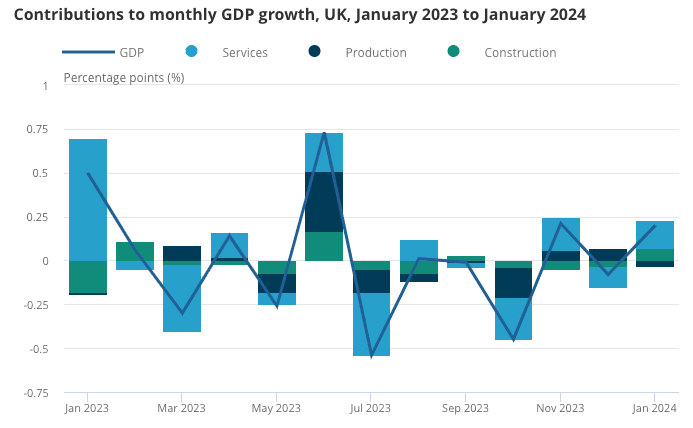Pound Sterling: GDP Recovery Can Stem Losses Against Euro, Dollar
- Written by: Gary Howes

Image © Adobe Images
The UK economy returned to growth in January, according to monthly GDP data, which can help the British Pound stabilise from its recent slide against the Euro and Dollar.
The Pound to Euro exchange rate looked to consolidate recent losses at 1.17 after the ONS reported the economy grew 0.2% month-on-month in January. Meanwhile, the Pound to Dollar exchange rate was quoted at 1.2790.
The 0.2% growth matches investor expectations and compares favourably with December's -0.1%.
Breaking it down, we see a strong recovery in the dominant services sector being the main engine of the growth (+0.2% m/m), an outcome that was signalled by the official January retail figures, released last month. A jump in construction output (1.1% m/m also helped.
"The economy is starting to turn a corner. The technical recession that the UK slipped into late last year will be short-lived. And we should see growth gradually return to its trend rate over the course of the year, as sentiment continues its uptrend and fiscal and monetary policy loosen through 2024,” says Sanjay Raja, Chief UK Economist at Deutsche Bank.
Compare Currency Exchange Rates
Find out how much you could save on your international transfer
Estimated saving compared to high street banks:
£2,500.00
Free • No obligation • Takes 2 minutes
UK manufacturing production was unchanged at 0% m/m in January, down from 0.8% in December and in line with expectations. Industrial production disappointed with a -0.2% outcome, below the 0% expected.
These data speak of an improvement in activity; however, the recovery is uninspiring and speaks of an economy that has been flatlining for months now.
For the Pound, the figures could have been worse and extended the current week's run of losses. However, meeting expectations can draw a line under the sell-off and allow some consolidation to take place near current levels.
"Momentum is likely to remain weak in the near-term, but the outlook for this year is improving. With both energy and domestic inflation moderating faster than expected, the chance of a modest cut in interest rates in the summer has risen. And the recent Budget will deliver some added relief for consumers and build on the measures in the Autumn Statement to strengthen incentives for business investment," says Ben Jones, Lead Economist at the CBI.
Sandra Horsfield, an economist at Investec, says her key takeaway is that the healthy, if unspectacular overall gain in January, left the level of output the highest since September 2023.
"Therefore, even with zero further growth in February and March – an unlikely outcome, given rises in household real disposable incomes reflecting above-inflation wage gains, few job losses and also lower rates of employee National Insurance Contributions – the economy is on track to have exited its shallow technical recession of H2 2023 already as of Q1," she says.





